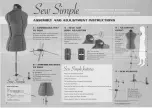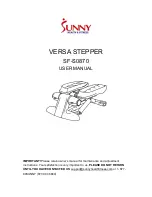
14
3.6.3 Setting the needle feed (rough)
In the lower dead point of the needle bar (needle), the distances
A between the needle and the walls of the needle aperture in
the throat plate insert must be alike.
Caution! Danger of injury!
Switch off the main switch! Before starting the
setting operation, wait until the motor stops!
- Set the needle bar to its lower dead point /corresponding to
the anle of 180
°
on the hand wheel (1)/.
- Fix the position by tightening screw (2).
- Loosen screw (3) and set the distances A. Then retighten
screw (3).
3.6.4 Lower feed wheel
3.6.4.1 Feeding clutches
3.6.4.1.1
Description
The feeding clutch is formed by the clutch cover (1) driven
from the connecting bar (2), by the clutch star (4) driven from
the connecting rod (3) and by the carrier plate (5) firmly
connected with the shaft (6). Of the clutch give the connecting
rods (2 and 3) an opposite direction swinging movement. The
clutch is coupled by means of the wedge (7) on the connecting
rod (8) through the eccentric (9) which is placed on the lower
shaft (10).
In the position, when the wedge is disengaged, the star (4)
is shifted out from the frictioning engagement with the lining of
the carrier plate (5) by means of the spring washer (11). The plate
(5) lining is then pushed by means of a flat profiled spring (2)
against the cover of the clutch (1).
In the position, when the wedge is disengaged, the star (4)
is pushed against the plate (5) lining and, at the same time,
the friction connection with the cover of the clutch (1) is
disconnected. Within a short instant, when engaging and
disengaging with the carrier plate (5), there are in a friction
engagement both the cover (1) and also the star (4), namely in
the dead centre of the connecting rods (2 and 3). The setting
of the change-over of clutches is done by tightening or by
loosening the nut (13).
3.6.4.1.2
Setting the lever of the second step of
feeding (angle, position)
The lever of the second step (1) must be set in such a way
that, in the bottom dead centre of the needle, a part of the
clutch disk (2) halves the angle between the screws (3). The
pin screw (4) can be mounted into the position /4.1 -
corresponds to the stitching categories 100 and 200/ or into
the position /4.2 -corresponds to the stitching categories 300
and 400/ (see par. 11.2).
Caution! Danger of injury!
Switch off the main switch! Before starting the
setting operation, wait until the motor stops!
Lever (1) displacement
- Loosen the screw (6).
- Set the maximum stitch length.
- Set the angle 180
°
on the handwheel.
- Unscrew the screw (5) and put the needle shank in its hole.
- Turn the lever (1) until the needle drops into the clutch disk (2).
- Side set the lever (1) to the measure A= 0.5 to 1 mm.
- Tighten the screw (6).
- Screw in the screw (5) and seal it with the Loctite cement.
Change of the position of the pin screw (4).
- Remove the retaining ring (7).
- Unscrew the screw (4) and screw it into the new position and
tighten it duly. Mount the connecting rod (8) and the retaining
ring (7).
7 8
1 4
2
5
3
1/2
1/2
2
3
5
8
6
4.2
4
1
4.1
A
180
o
3
9
1
13
7
4
12
5
11
6
10
8
2
A
A
1
2
3
















































